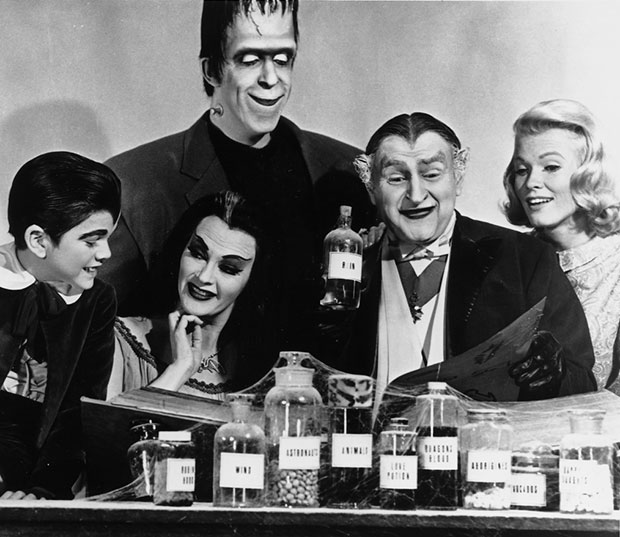
A particularly haunting October is upon us, plagued with the cruelest of fates that might ever grace the Halloween season. After over two years of promises that Bryan Fuller would be recreating the classic sitcom The Munsters for NBC — stocked with a cast including Jerry O’Connell, Portia de Rossi, and Eddie Izzard — Deadline reports a rumor that the network could be canning the project entirely. Do you hear that? It’s the sound of vampires, werewolves, monsters… not existing.
Fuller’s reimagining of the 1960s series adopted the title Mockingbird Lane (after the family’s street address), and sought to approach the source material with a dramatic spin and a drive to highlight the fantastical aesthetics of the Munsters’ personal world. But along with the new, at the heart of the project existed the family of five: bumbling working-class dad and Frankenstein’s monster Herman (the role taken by O’Connell), his level-headed wife and vampire Lily (taken by de Rossi), their precocious young werewolf son Eddie and “normal” niece Marilyn, and Lily’s curmudgeonly, eccentric father, simply dubbed Grandpa (taken by Izzard).
According to Fuller himself, Mockingbird Lane will live on. The writer tweeted the following message late Monday night following Deadline‘s report:
NBC just informed me the Deadline article regarding #MockingbirdLane was Dead Wrong.Stay tuned for updates!
— Bryan Fuller (@BryanFuller) October 2, 2012Still, the very presence of a rumor like this has to be unsettling for those eagerly awaiting the project’s arrival. Why is it that the world is so ready to cast out a contemporary reboot of The Munsters? It’s not as though revivals of other old shows haven’t worked. In fact, there’s one show that is strikingly similar to The Munsters that has enjoyed a great degree of success throughout the past few decades: The Addams Family.
The Munsters premiered in the fall of 1964 on CBS, just one week after the debut of The Addams Family, the famous ABC sitcom to which The Munsters is unsurprisingly compared quite frequently. Both were about “monstrous” clans, both were ingrained with humane family values and wholesome comedy, and both aired for two seasons on their respective networks. But only The Addams Family has spawned multiple big screen feature films, a Broadway adaptation, and a cartoon series, while The Munsters struggles to find a reimagining on network television. So what’s makes the Addams troupe worthy of all this success, while the strikingly similar Munsters clan can’t catch a break? It’s hard to ignore the biggest difference between the two: the Addamses were rich, and the Munsters were poor.
Gomez, the Addams family patriarch, was the beneficiary of an inexplicably colossal inheritance, which he used to treat his wife Morticia, children Wednesday and Pugsley, and various live-in/come-and-stay-a-while relatives (Uncle Fester, Cousin Itt, Grandmama, Thing) to lives of unwavering luxury. Waited on tirelessly by butler Lurch, the Addams family never faced the financial adversity afforded to the Munsters: a simple working-class California family who happened to look like genetic experiments.
Herman worked long hours at Gateman, Goodbury and Graves funeral parlor, struggling to keep his family comfortable and always vying to impress his boss. Meanwhile, Lily and her father would occasionally seek employ themselves, in the interests of providing for Eddie and Marilyn. The Munsters were not depicted with the financial amenities of the Addams family; despite backstories that would allude to Herman’s nobility and Grandpa’s counthood, they were always shown to be a blue collar family with the same problems their viewers might have been facing.
Whether or not this comes into play whatsoever in the Munsters’ lack of lasting appeal as opposed to the Addams’ is up for speculation. It might well just be the latter family’s notably greater eccentricity, its wide variety of increasingly weird cousins, or its incurably catchy theme song that makes it a timeless hit. But we can learn something from the Munsters that we can’t from the Addams family: just because some people might look different and act different, that doesn’t mean that they can’t be related to.
At their very core, the Addams family members were fundamentally strange. They enjoyed the macabre, delighted in the morbid. They were the opposite of normal at their very core, as devised by creators. To put it in comic book terms, the Addams were Bizarro-people. Whatever we felt, thought, did, they automatically took the opposite stance. The Munsters might have appeared strange and employed some peculiar practices, but their motivations and sentiments were not unlike those of the families on Leave It to Beaver and My Three Sons. They valued love, hard work, peace, neighborliness. They’d never revel in destruction or someone’s misery, as did the Addams. The Addams weren’t bad people, they were just good monsters. The Munsters were good people. And so-so monsters, really (Grandpa’s potions never quite worked).
This isn’t to condemn The Addams Family or deem it unworthy of its success. The show and the many incarnations it has spawned are undeniably fun and entertaining. But The Munsters deserves the same kind of presence. Hopefully, tales of Mockingbird Lane‘s demise are simply rumors, and Fuller’s vision will take to the airwaves soon, affording a new sincerity and aesthetic celebration of the hard-working, well-meaning, wholly average American family. Our generation needs The Munsters: a fivesome who sought to teach the world that looks can be deceiving, that family is the greatest treasure of all, and that underneath whatever monster you might fear, you can find a heart of gold.
[Photo Credit: CBS]
More:
‘Last Resort’ ‘Badass’ Autumn Reeser Tells Us What The Big Mystery is All About
Toasting the 30th Anniversary of ‘Cheers’: The First Show That Was Just About People
TNT Releases Winter Premiere Dates For ‘Rizzoli & Isles,’ ‘Dallas,’ and More


